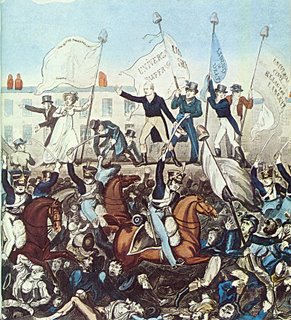
The establishment hasn't been so rattled about the dissent of the hoi-polloi since Peterloo.
Too many members of those who wish to maintain the status quo are now starting to talk about regulating what we do because they can see that the blogosphere is not under their control. As they do this, may they consider the following, from "
Declaration of the Rights of Man and of the Citizen" published by the National Assembly in France in August 1789.
- No man ought to be uneasy about his opinions, even his religious beliefs, provided that their manifestation does not interfere with the public order established by the law.
- The free communication of thought and opinion is one of the most precious rights of man: every citizen can therefore talk, write and publish freely, except that he is responsible for abuses of this liberty in cases determined by the law.
- The guaranteeing of the rights of man and the citizen requires public force: this force is therefore established for everybody’s advantage and not for the particular benefit of the persons who are entrusted with it.
After the massacre, at St Peters Fields, of those agitating for Parliamentary reform and the repeal of the Corn Laws, Shelley was inspired to write The Masque of Anarchy, including these lines.
'Rise like Lions after slumber
In unvanquishable number -
Shake your chains to earth like dew
Which in sleep had fallen on you -
Ye are many - they are few.'
A whilst in France, witnessing the birth of the Revolution, Wordsworth (momentarily eshewing the merits of daffodils) described himself thus,
An Englishman,
Born in a land whose very name appeared
To license some unruliness of mind
I have to ask, who took the license away when we weren't looking?


1 comment:
Percy B displays admirable sentiments in that verse but poetically it blows dog IMHO.
Post a Comment